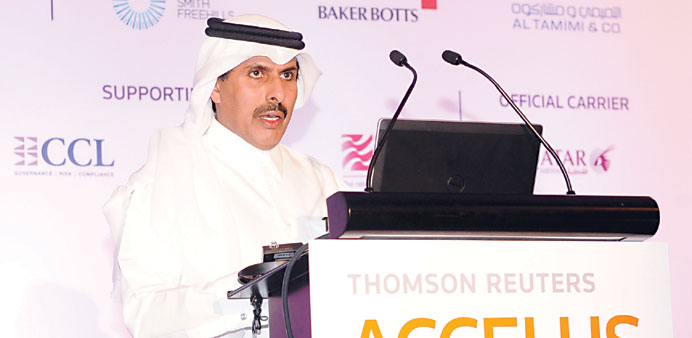|
|
The Qatar Central Bank (QCB) has called for closer co-operation among the regulators in the GCC to effectively address the loopholes in the region’s financial and business regulatory frameworks.
“Co-operation amongst GCC (Gulf Cooperation Council) regulators is now a crucial need especially as we move forward with addressing loopholes in the GCC financial and business regulatory frameworks,” QCB Governor HE Sheikh Abdullah bin Saud al-Thani told the 7th GCC Regulators Summit, which got underway in Doha yesterday.
Qatar has made rapid developments in the financial sector with the setting up of credit bureau and legislating a new law to enhance financial stability in the country, he said at the summit, hosted by Thomson Reuters, in association with the QCB, the Qatar Financial Market Authority and the Qatar Financial Centre Regulatory Authority (QFCRA).
In December last year, the government approved a law that provides for an umbrella body to regulate banks, financial services and insurance companies and the country’s bourse as well as banking, financial and insurance companies licensed by the Qatar Financial Centre.
In March 2012, the central bank governor had become the chairman of the QFCRA, a step towards establishing a single regulator for the country.
“Total assets managed by the commercial banks in Qatar have increased by 18% to reach QR817bn in 2012 and QR828bn by end of January 2013,” he said.
Despite credit facilities increasing by 27% to QR477bn in 2012, the banking system’s non-performing loans stood as low as 1.7% of total loans, indicating better asset quality, he added.
Total deposits increased by 26% to reach QR458bn in 2012, he pointed out.
Tajinder Singh, director general of International Organisation of Securities Commission (IOSCO), said with the capital regulations becoming tighter, the risks are being shifted from the banking sector to shadow banking. The shadow banking system is the collection of non-bank financial intermediaries that provides services similar to traditional commercial banks. It includes entities such as hedge funds, money market funds and structured investment vehicles.
Globally, a study of the 11 largest national shadow banking systems found that they totalled $50tn in 2007, fell to $47tn in 2008, but by late 2011 had climbed to $51tn, just over its estimated size before the crisis.
Stressing that “it is vital that we contribute to enhancing confidence around transparency, governance and investor protection in the GCC’s financial markets,” Basil Moftah, managing director (Middle East, Africa and Russia/CIS), Global Growth Operations said the summit provides a networking and discussion platform for authorities, practitioners, advisors and market participants.

